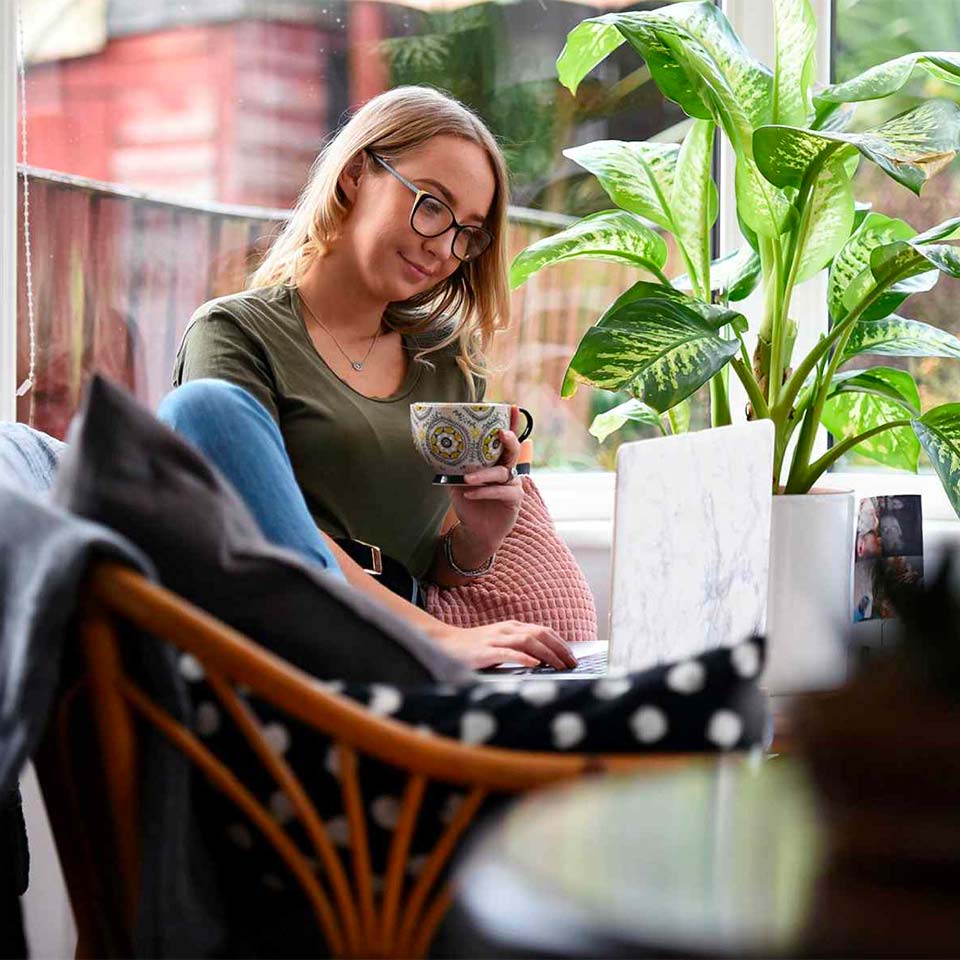It is important to remember that not everybody is the same and we all cope differently. We need to look after our mental and physical wellbeing, and stay connected where possible.
That's why we've put together the following advice and information to help our Team Teesside community during these difficult times.
Working and studying from home
Working from home can be challenging. We don’t all have access to reliable IT facilities, and some of us may be home schooling and managing childcare commitments.
Just do the best you can and remember, you are not working from home – you are at home trying to work in exceptional circumstances. Don’t put yourself under additional pressure by assuming other people are coping better than you – they probably aren’t and in any case, success isn’t measured in the same way as before.
Things to try
- Create a dedicated workspace in your home and try and maintain a regular schedule where possible
- Build in regular breaks and consider eating lunch away from your workspace
- It's important to be comfortable so why not check out some advice on how to set up your workstation?
- It is important to be active and not sit for long periods, so why not go outside whenever you can for some fresh air and a change of scene?
- You can also try some stretching and mobility exercises at your desk. There are useful videos on YouTube (search 'Stretchwell') and Bupa UK has provided some handy instructions on its website.
- Keep in touch with your colleagues and fellow students, and support each other as much as possible
If you are having IT problems, our ITDS team can provide help and support on 01642 342220 or you can email ithelp@tees.ac.uk.

Key workers and students on campus
If you are a key worker, or a student living on campus, it’s important to remember that you’re not alone.
Mental health
We appreciate this is an extremely difficult time for many people within our University community. If you are aware of a student in distress or you feel they need to be seen as a priority due to their mental health, please take them to the Security Office or to the Student Life Building where they will be connected to an adviser. We have a mental health adviser on call daily during office hours. If the student is not with you, please direct your referral to mailto:SLSresponse@tees.ac.uk
There is some useful information on the Mind website for onsite workers, including practical advice and suggestions on looking after your mental health.
Mind website
Accommodation
Our Accommodation team is available to provide support for students living in University residences, and you can contact us by email accommodation@tees.ac.uk.
Alternatively you can find support on our halls of residence Facebook pages. Please contact us if you would like to be added to our hall’s Facebook group.
General advice
Our Occupational Health team can provide advice and support to colleagues on a range of health and wellbeing matters.
Check out the staff My Wellbeing page for more information
Fitness and exercise
Exercise is great for your physical and mental wellbeing. Being active might take a little more imagination than it used to, but whether it is Joe Wicks in your living room, waking the dog or going for a jog, exercise can be a real boost.
Looking for inspiration to get you started? Try these Team Teesside workouts to get you moving. They can be done in the home or garden and you don't need any specialist equipment to take part. Always remember to warm up and cool down.
Need fitness tips? Join our online Q&A
Chat online with the Sport & Wellbeing team for hints and tips on keeping active. They have plenty of ideas to help - and it's a great chance to ask questions and keep in touch with friends.
Join the conversation on Microsoft Teams, Thursdays from 11.00am.
Couch to 5k and more
The NHS website is full of great suggestions about how you can become more active and boost your health and wellbeing.
For example, you could run your first 5k in just nine weeks by following this step-by-step plan.
Mental health
It’s okay not to feel okay. If you are feeling down speak to friends and family, or your line manager or course leader.
Stay in touch with people as much as you can, be kind to each other and ask for help if you need it.
A guide to looking after yourself and others
Keep busy
Being social distanced from friends and family is difficult, as we can’t do many of the things we normally would. As with as physical activity, it is important to keep the mind occupied to maintain our overall wellbeing.
Things to do
- If you enjoy reading, why not join our online reading group. The Virtual Book Club meets every two weeks on a Wednesday at 2.00pm to discuss their latest reads. Grab a cuppa, get comfy – it’s you chance to catch up.
You can join in the chat on Microsoft Teams - Our Faith and Reflection Service hosts a range of online activities to help our colleagues and students stay connected – there’s lots going from visits by Brengle the Therapy Dog, to online chats, to prayer groups.
Faith and Reflection events - Focusing on an activity can help reduce anxiety. Our Crafting Group meets on Mondays at 12.00pm on Microsoft Teams.
More about the Crafting Group - Senior Lecturer in Graphic Design, Amy Dover, is sharing her artistic expertise online. She's delivering free weekly art workshops on Instagram TV @amy_dover and her videos will be uploaded on YouTube. There are also colouring-in sheets to help keep your children, and you, entertained! It's great for relaxation and mindfulness.
www.amydover.com
Nutrition
Being at home may mean we have more access to food, and changes in routine can lead to temptation, so it can be difficult to make healthy choices. It is important to ensure variety and balance in your diet to maintain a strong immune system, and boost your mind and body.
Kelly Rose, a qualified nutritionist, offers online advice each week, and she can answer your questions about food and nutrition. Kelly has tips for cooking with limited supplies, and lots of nutritional advice to help boost your immunity and mood.
Get involved on Fridays at 11.00am
The BBC Good Food section also has lots of great ideas and recipes, and you could try following Jack Monroe on social media too.
The BBC Good Food
Follow Jack Monroe on Twitter
Dealing with bereavement
Covid-19 may sadly affect us all at some point, either directly or indirectly.
Colleagues are entitled to paid time off from work should you lose a family member.
Special Leave of Absence Guidelines
Further information is available from Dying Matters, a coalition of individuals and organisations across England and Wales. Its aims are to help people talk more openly about dying, death and bereavement, and to make plans for the end of life. Additional information on dealing with grief and bereavement is available via the link below.
Dying Matters
Dealing with grief and bereavement

Advice for managers
If you are a people manager, don't forget to look after your own wellbeing at all times too.
Establish a work pattern that works for you and your team, and remember the importance of regular, informal communication. Informal social interactions can really boost morale and strengthen team bonds.
If you need support or advice, your Human Resources team is here to help.
Useful links
- Public Health England presentation
Working from Home - Display Screen Equipment - Quick Fixes - Mind
Coronavirus and your wellbeing
More information
It’s easy to feel isolated and overwhelmed at times, so please remember you're not alone and other people are facing the same challenges. Why not take a few minutes to read how some of our colleagues are coping with lockdown, as it may help to know that we’re all in this together?
Get in touch
Please continue to share your activities and let us know what you are doing by emailing communications@tees.ac.uk.













